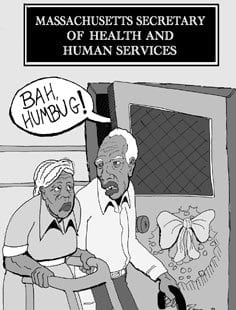
A lump of coal for the BMC
|
|
“They are not interested in health care for poor people like us.” |
Christmas is the season for joy and generosity, but Scrooge is an ever-menacing presence lurking in the shadows. Charles Dickens’ famed story “A Christmas Carol” has taught us that Scrooge’s victims are most assuredly society’s poor and powerless.
In Dickens’ 19th century England, old Scrooge stepped forward and did his dirty work himself. Matters are a bit more sophisticated 200 years later. Scrooge can now take refuge beneath the golden dome of the State House and assign his henchmen (or women) to carry out his nefarious schemes.
Fortunately for Scrooge, some of his acolytes seem to revel in their unpleasant tasks; fortunately for them, the state budget crisis has created multiple opportunities to be abusive. Dr. JudyAnn Bigby, the secretary of health and human services, has been inspired to take this opportunity to dismantle the state’s safety net hospitals. She seems to have adopted the motto, “Never let a crisis go to waste.”
The problem is that the nationally touted universal health insurance plan in Massachusetts is beginning to disintegrate under financial pressure. The funds provided were never adequate, and additional cutbacks threaten to cause the whole system to collapse. Now comes Secretary Bigby to the rescue.
Her first step was to refuse to pay Boston Medical Center (BMC) $64 million for health care provided last year to low-income patients. According to an agreement with the state, these funds are always paid retroactively. Because of that binding agreement, Bigby will likely be unsuccessful in her efforts.
Not to be undone in her Scrooge-like duties, the secretary has also proposed $114 million in budget cuts for next year. This is an obvious attempt to make it impossible for the staff at BMC to achieve its objective of “exceptional care without exception.” Perhaps Bigby has a sinister wish for the quality of care at BMC to erode, so patients would go elsewhere and the cost of treating low-income individuals would be more widely distributed.
The financial problem at safety net hospitals is easy to understand, and very easy for some to ignore because it involves the poor — a prime target of Scrooge tactics. At BMC, 51 percent of the patients have low incomes and 31 percent are on Medicaid. The problem with Medicaid is that hospitals are paid only 64 percent of the cost of the medical care. In the more financially stable past, government supplemental payments made up the difference.
In other university teaching hospitals, only between 7 percent and 11 percent of the patients are on Medicaid. The normal reimbursement for medical care by health insurance is 105 percent of costs, or more in some cases. So there is a built-in cushion in the payment system to accommodate a modest number of Medicaid patients.
Another problem at safety net hospitals is that patients miss about 30 percent of their appointments, a rate 50 percent higher than other hospitals. This is because low-income patients are often hourly workers who cannot always get time off, or have transportation problems or family emergencies. Missed appointments are a lost revenue-earning opportunity for hospitals.
Rather than degrading the care at BMC for lack of funds, a better approach that is more consistent with the Christmas spirit is to require hospitals to pay a stipulated sum into a fund if they did not treat a required number of Medicaid patients. That money would then be distributed to the safety net hospitals. This sounds like déjà vu, but it is more in the Christmas spirit.
Such a simple plan could possibly bring a seasonally appropriate smile to Scrooge’s countenance. But it would probably not please Secretary Bigby.






